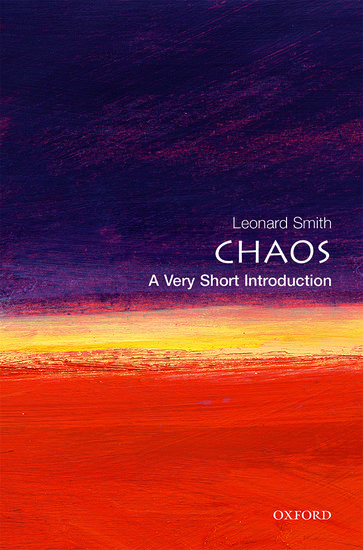Home >
A Very Short Introduction >
Chaos (Mathematics)
A Very Short Introduction | Mathematics
Chaos
ISBN: 9780192853783
Series: A Very Short Introduction
Chaos (Mathematics)
A Very Short Introduction Chaos (Mathematics) Media > Books > Non-Fiction > Education Books Expect Delays of Up to 4 Weeks| Order Below |
ISBN
9780192853783 (10-digit ISBN: 0192853783)
- Description
- Key Features
- Series Description
- Table of Contents
- Chaos theory is one of the most exciting and fast-growing areas of mathematics and physical science today.
- It unifies simplicity and complexity, and order and randomness, to give us a new understanding of a physical processes and events.
- Ideal for the non-mathematician - Leonard Smith uses accessible examples and terms to give the reader a full understanding of this exciting field.
Chaos exists in systems all around us. Even the simplest system of cause and effect can be subject to chaos, denying us accurate predictions of its behaviour, and sometimes giving rise to astonishing structures of large-scale order. Our growing understanding of Chaos Theory is having fascinating applications in the real world - from technology to global warming, politics, human behaviour, and even gambling on the stock market.
Leonard Smith shows that we all have an intuitive understanding of chaotic systems. He uses accessible maths and physics (replacing complex equations with simple examples like pendulums, railway lines, and tossing coins) to explain the theory, and points to numerous examples in philosophy and literature (Edgar Allen Poe, Chang-Tzu, Arthur Conan Doyle) that illuminate the problems. The beauty of fractal patterns and their relation to chaos, as well as the history of chaos, and its uses in the real world and implications for the philosophy of science are all discussed in this Very Short Introduction.
Oxford's Very Short Introductions series offers concise and original introductions to a wide range of subjects--from Islam to Sociology, Politics to Classics, Literary Theory to History, and Archaeology to the Bible.
Not simply a textbook of definitions, each volume in this series provides trenchant and provocative--yet always balanced and complete--discussions of the central issues in a given discipline or field. Every Very Short Introduction gives a readable evolution of the subject in question, demonstrating how the subject has developed and how it has influenced society. Eventually, the series will encompass every major academic discipline, offering all students an accessible and abundant reference library.
Whatever the area of study that one deems important or appealing, whatever the topic that fascinates the general reader, the Very Short Introductions series has a handy and affordable guide that will likely prove indispensable.
Please note: As this series is not ELT material, these titles are not subject to discount.
Preface
1: The Emergence of Chaos
2: Exponential Growth, Nonlinearity, Common Sense
3: Chaos in Context: Determinism Randomness and Noise
4: Chaos in Mathematical Models
5: Fractals, Strange Attractors, and Dimension(s)
6: Quantifying the Dynamics of Uncertainty
7: Real numbers, Real Observations and Computers
8: Sorry, Wrong Number: Statistics and Chaos
9: Predictability: Does Chaos Constrain Our Forecasts?
10: Applied Chaos: Can We See Through Our Models?
11: Philosophy in Chaos
Glossary
Further Reading
Chaos exists in systems all around us. Even the simplest system of cause and effect can be subject to chaos, denying us accurate predictions of its behaviour, and sometimes giving rise to astonishing structures of large-scale order. Our growing understanding of Chaos Theory is having fascinating applications in the real world - from technology to global warming, politics, human behaviour, and even gambling on the stock market.
Leonard Smith shows that we all have an intuitive understanding of chaotic systems. He uses accessible maths and physics (replacing complex equations with simple examples like pendulums, railway lines, and tossing coins) to explain the theory, and points to numerous examples in philosophy and literature (Edgar Allen Poe, Chang-Tzu, Arthur Conan Doyle) that illuminate the problems. The beauty of fractal patterns and their relation to chaos, as well as the history of chaos, and its uses in the real world and implications for the philosophy of science are all discussed in this Very Short Introduction.
Key Features
- Chaos theory is one of the most exciting and fast-growing areas of mathematics and physical science today.
- It unifies simplicity and complexity, and order and randomness, to give us a new understanding of a physical processes and events.
- Ideal for the non-mathematician - Leonard Smith uses accessible examples and terms to give the reader a full understanding of this exciting field.
Series Description
Oxford's Very Short Introductions series offers concise and original introductions to a wide range of subjects--from Islam to Sociology, Politics to Classics, Literary Theory to History, and Archaeology to the Bible.
Not simply a textbook of definitions, each volume in this series provides trenchant and provocative--yet always balanced and complete--discussions of the central issues in a given discipline or field. Every Very Short Introduction gives a readable evolution of the subject in question, demonstrating how the subject has developed and how it has influenced society. Eventually, the series will encompass every major academic discipline, offering all students an accessible and abundant reference library.
Whatever the area of study that one deems important or appealing, whatever the topic that fascinates the general reader, the Very Short Introductions series has a handy and affordable guide that will likely prove indispensable.
Please note: As this series is not ELT material, these titles are not subject to discount.
EASY ORDER FORM
PRICES LISTED INCLUDE CONSUMPTION TAX
Price Before Tax:
¥1,790


